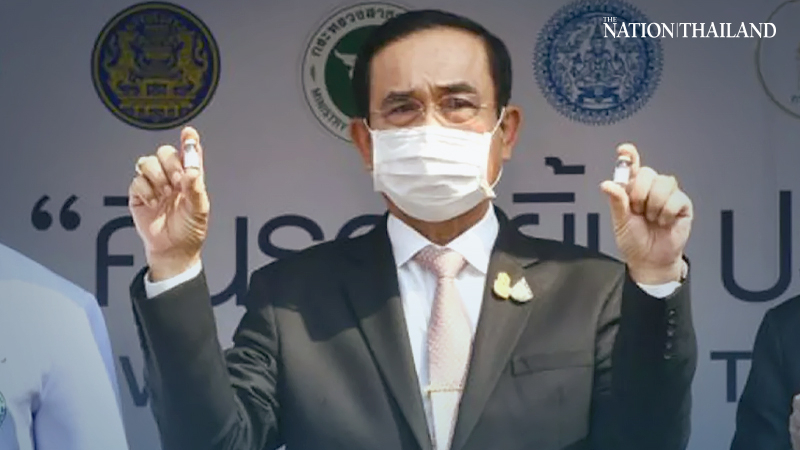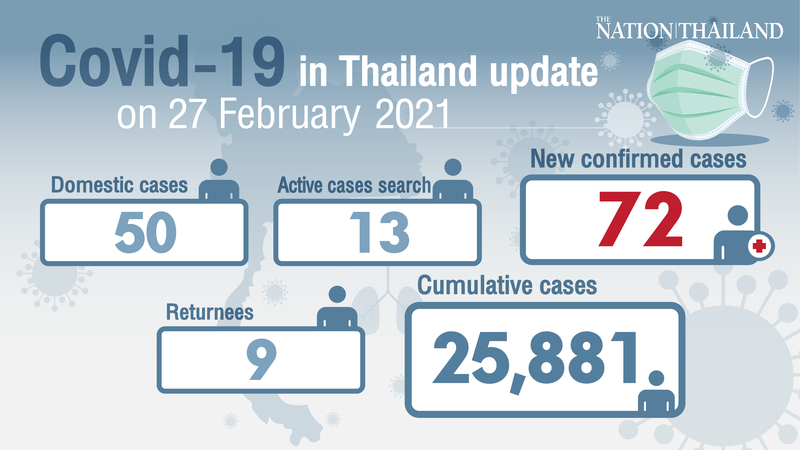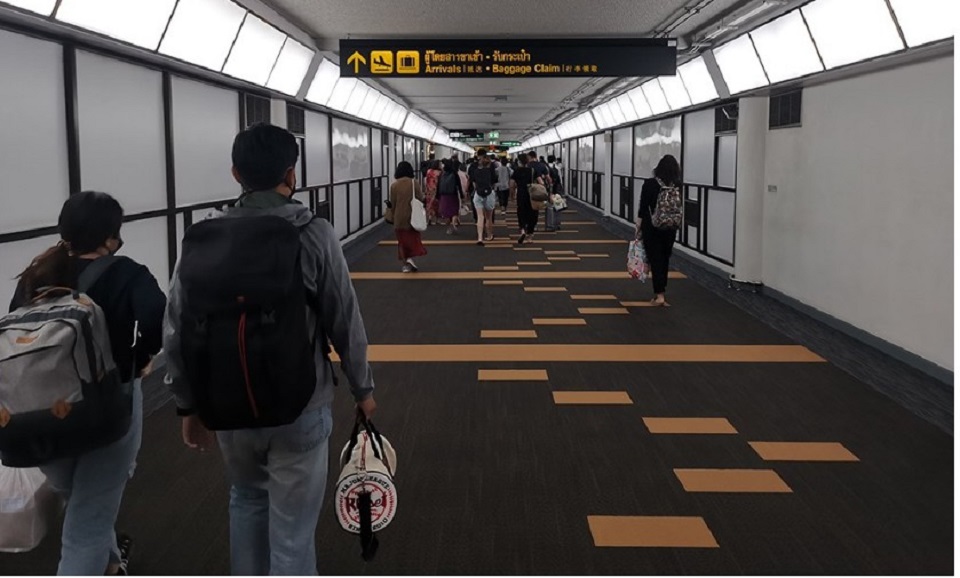Thailand's COVID-19 inoculation programme will likely kick off on Sunday, with top government figures receiving the first jabs to boost public confidence. The vaccine brings hope that the country's year-long virus nightmare may soon be over.
If the vaccine rollout proves a success, the government will regain public faith, the economy will rebound, and life will finally – albeit slowly – get back to normal.
Prime Minister General Prayut Chan-o-cha is due to be the first person in Thailand to get a COVID-19 shot, with Public Health Minister Anutin Charnvirakul next in queue. They will receive their jabs at Nonthaburi's Bamrasnadura Infectious Disease Institute, which has laid down a model vaccination procedure for other medical facilities to adopt.
Owing to the difference in age, Prayut and Anutin will get different vaccines. The AstraZeneca shot will be administered to 66-year-old Prayut, while Anutin, 54, will get China's CoronaVac.
Under Thailand's vaccination programme, people aged 60 and over will get the AstraZeneca shot, while those aged 18-59 will get CoronaVac at least until Thailand starts producing the AstraZeneca vaccine locally.
Thailand has so far acquired 317,600 doses of COVID-19 vaccine, after taking delivery of 200,000 shots of CoronaVac and 117,600 of AstraZeneca on February 24.

What Thais can expect in the coming weeks?
Vaccination is expected to start from Monday (March 1), but given the limited supply of shots, most Thais will not be vaccinated anytime soon. They will likely have to wait at least until June to get inoculated.
The Public Health Ministry has decided to share the first batch of doses among only 13 provinces – Samut Sakhon, Bangkok, Pathum Thani, Nonthaburi, Samut Prakan, Tak (Mae Sot), Nakhon Pathom, Samut Songkram, Ratchaburi, Chon Buri, Phuket, Surat Thani (Samui) and Chiang Mai.
The first nine provinces are prioritised because they have the highest infection rates or risk. The other four will receive urgent doses because they play a crucial role in the economy, as they are popular tourism destinations, attracting millions of tourists each year.
Samut Sakhon, the centre of the latest outbreak, will get the largest number of doses at 70,000, followed by Bangkok (66,000 doses). Pathum Thani will be given 8,000 doses, Nonthaburi 6,000, Samut Prakan 6,000, Tak 5,000, Nakhon Pathom 3,500, Samut Songkhram 2,000, and Ratchaburi 2,500. Of the four economically crucial provinces, Chon Buri will get 4,700 doses, Phuket 4,000, Surat Thani 2,500, and Chiang Mai 3,500 doses. A small number of doses will be held back for emergencies.
The Government Pharmaceutical Organisation and DKSH have joined hands to ensure vaccines can be delivered to a hospital anywhere in Thailand within 24 hours via a cold chain system.
CoronaVac shots will be administered on Monday to Friday, while AstraZeneca vaccines will be given on Saturdays and Sundays only.
Who will get priority?
Prioritised for vaccination are frontline medical and other workers, staff dealing with COVID-19 patients, staff at state quarantine facilities and patients with chronic diseases. Vaccination will be rolled out to the general population as more shots are delivered.
How to get free vaccination
People who have a smartphone can register for free COVID-19 vaccination via the Public Health Ministry's MorProm (Ready Doctors) LINE application. Those without a smartphone will be approached by village health volunteers, if they rank among the priority groups.
People who qualify for early shots because they suffer from a chronic disease can also register with their hospital. Vaccination is voluntary.

How many Thais are willing get a shot?
An online survey released earlier this month by the Public Health Ministry found that about 69% of respondents want to be vaccinated.
However, a recent Suan Dusit Poll revealed that only 20.7% of respondents are determined to get the jab, having no concerns over possible side effects. As many as 65.99% said they preferred to wait and see if there were any side effects in those being inoculated first.
Although both AstraZeneca vaccine and CoronaVac have already been registered in Thailand as safe for use, they are not without side effects. For example, more than one in 10 people vaccinated with AstraZeneca shots may experience soreness, itching or swelling at the injection site and feelings of tiredness, headache, muscle pain, joint pain, nausea, and fever (temperature above 38 degrees Celsius). However, these same side effects are not uncommon after vaccination for other diseases.
Less common side effects (up to one in 100 people) are dizziness, abdominal pain, enlarged lymph nodes, sweating and itchy skin or rash.
As for CoronaVac, data suggests the biggest potential side effects are localised pain, headache and fatigue.
AstraZeneca vs CoronaVac
The vaccine developed by multinational pharmaceutical firm AstraZeneca and Oxford University uses a harmless, weakened version of a common virus that causes colds in chimpanzees to trigger the human immune system to fight COVID-19. This so-called viral-vector technique has been used to produce vaccines against several diseases before.
According to the World Health Organization, the AstraZeneca vaccine prevents symptomatic COVID-19 infections in 63.09% of cases. Data indicates it cuts risk of hospitalisation by 94%. Two shots are required, between 10 and 12 weeks apart.
CoronaVac, meanwhile, is an inactivated SARS-CoV-2 vaccine developed by Chinese pharma company Sinovac Life Sciences. Phase III data shows CoronaVac has 50.65% overall efficacy following two doses. Meanwhile, clinical trials in Brazil and Turkey indicate the vaccine is 83.7% effective in preventing severe cases and 100% effective against hospitalisation or death from COVID-19. Two shots are required, 21 days apart.
CoronaVac's reported overall efficacy is lower than other vaccines on the market, though authorities say it is relatively safe since it uses an old, tried-and-tested production technique.
What Thais should remember
Even after the COVID-19 vaccination programme begins in Thailand, we cannot afford to lower our guard. Vaccines may just protect against severe symptoms, not against transmission of the disease. Therefore, wearing face masks, washing hands frequently and physically distancing will be essential to preventing more outbreaks of COVID-19.
By Thai PBS World's General Desk





























